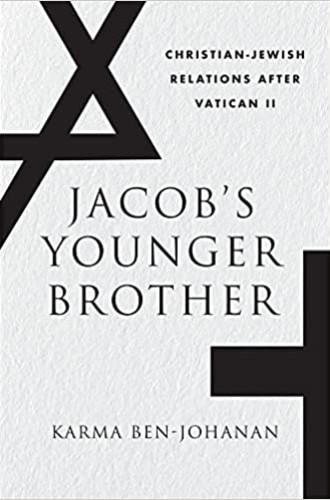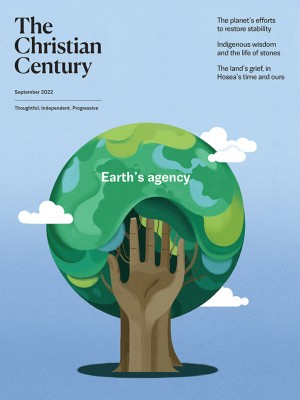Reconciliation or supersessionism?
Karma Ben-Johanan traces the troubled history
of Jewish-Christian relations after Vatican II.
This is a sobering book. It says that a lot of Christians professing pluralistic openness to Jews and contemporary Judaism are perhaps more interested in alleviating their guilt than anything else, and many Jewish leaders are less than enthusiastic about being suddenly accepted by religionists who until quite recently sang a different tune. While Christians want to claim quick friendship with Jewish counterparts, the latter can’t help but sense identity politics and virtue signaling in the air.
Focusing on Orthodox rabbis and Catholic priests, German-Jewish historian Karma Ben-Johanan tells a story that hasn’t been widely told before. As she explains in her introduction, “I am interested mainly in the closed conversations in which one community discusses the other without diplomatic considerations.”
Read our latest issue or browse back issues.
Jacob’s Younger Brother was published in Hebrew in 2020 and is now available in English. The work focuses on relations between Jews and Christians during what Ben-Johanan calls “the age of reconciliation,” from the Second Vatican Council’s pivotal 1965 declaration Nostra aetate through the 2013 resignation of Pope Benedict XVI.
After Nostra aetate, the papacy of John Paul II received mixed reviews. “John Paul II availed himself of grand historical gestures that left their imprint on both Jews and Christians while circumventing the debate on doctrinal issues,” Ben-Johanan writes. There were, for example, his historic visits to the Western Wall and Yad Vashem, the Holocaust museum in Jerusalem. He denounced antisemitism as a Christian sin, she recalls, but by the end of his long papacy, “no one continued to demand a radical doctrinal reform.”
Cardinal Ratzinger, too: “Ratzinger’s attempts to theologically systematize the Christian-Jewish relationship were largely experienced as harmful by Christians and Jews alike,” writes Ben-Johanan. For example, he muddied the waters in 2007 when, as Pope Benedict, he tried to appeal to ultraconservative Catholics by again allowing the traditional Latin mass—the one which includes the notorious Good Friday prayer which calls for the conversion of the Jews. His later attempts to clear this up and write a replacement prayer fell flat.
Still, Nostra aetate was a significant step in overturning millennia of anti-Judaism embedded in Catholic teaching and liturgy. And as Ben-Johanan points out, “the political independence of Jews in Israel has also removed many of the problems that characterized Christian-Jewish coexistence in the past.” There is a sense among Christians of a certain largesse of reconciling gestures that Israeli strength and Jewish independence have made less necessary.
Since the 1970s, biblical scholarship has increasingly located Jesus of Nazareth and the apostle Paul in the context of Second Temple Judaism, refiguring the antagonism between Jews and Jesus followers that is recorded in certain New Testament texts and rooted in interreligious rivalry that is de facto anti-Judaism. Early Christianity was, in fact, a Jewish movement. Similarly, current scholarship suggests a much later divorce between the two faiths than was once assumed—well after the Council of Nicaea.
Ben-Johanan tells a full story of the evolution of an uneasy relationship between these siblings, Christianity and Rabbinic Judaism. She points out that Augustine of Hippo was the first and most notable of the early Christian writers to justify the ongoing existence of Jews and Judaism while also portraying them as inferior. Jews, Augustine emphasized, are important as “witnesses” to the truth of the gospel. Later in the Middle Ages, Christians would label Jews as “deliberate traitors,” but “Augustine’s theological justification enabled the Jews of Europe to live in relative safety among their Christian hosts up until the twelfth century.” We needed them to point to our truth.
This view made it easy for popes to determine that “Jews had to retain their inferior status vis-à-vis their Christian neighbors and that they should be humiliated and constrained in various ways.” During the Reformation, Luther took this anti-Judaism to additional extremes, including in his condemnations of the Catholic Church the charge of “Judaizing,” referring to too much ritual and so-called legalism. These stains remain among Christians today, throughout our different theologies and denominations.
“The protection of church authorities allowed Jews to exist . . . within Christian society” from Augustine through Luther and well into the 20th century, explains Ben-Johanan. This sense of Christian “generosity” took a theological turn with the Catholic Church’s Nostra aetate.
So now, as post–Vatican II Christians, we ask our Jewish colleagues to be witnesses to our open-mindedness. It is as if “the church had to be absolved of anti-Judaism,” the author writes. But open-mindedness wasn’t and isn’t enough, and it will take centuries of renewing friendship and mutual respect in order to repair the familial relationship between Jews and Christians.
We rarely tell these stories, because to tell them is to betray a key principle of our liberalism: be conciliatory at all costs. But the message of this book is important to everyone involved in interfaith work, because the language of interfaith work is too often a gesture without teeth. When rabbis talk with each other, Ben-Johanan says, they often share that their experience of Christian interreligious dialogue efforts is that we want little more than for them to be witnesses to our progressiveness. “In fact, the very thought of an age of reconciliation that brings an end to the old relationship, with all its problems, is in itself supersessionist.”







